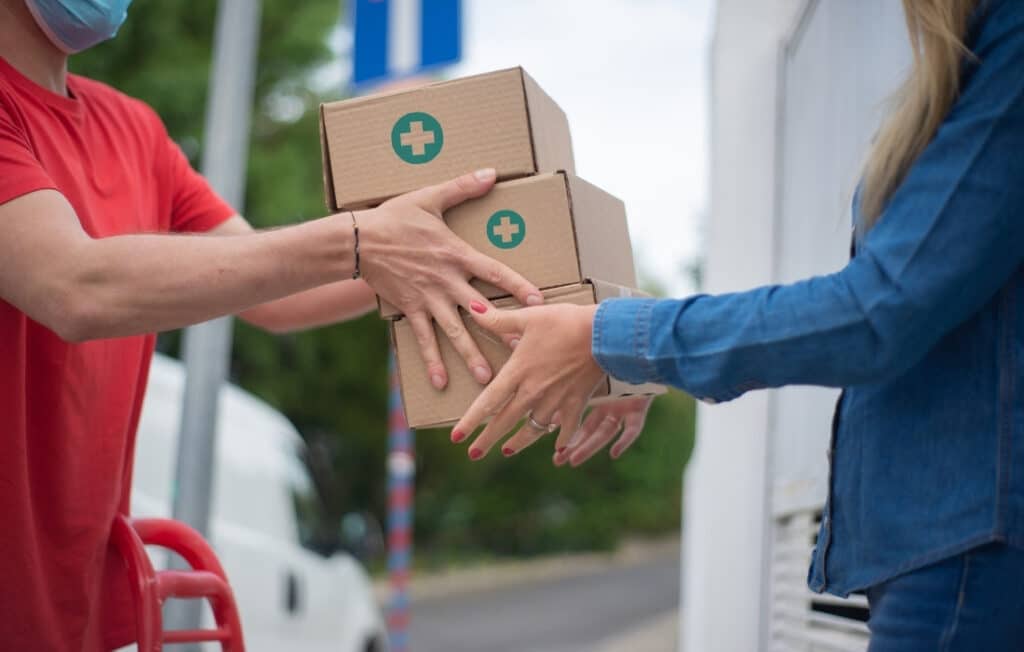In the rapidly evolving world of medical treatment, the integration of alkylating drug couriers has marked a significant advancement. These specialized carriers are designed to deliver alkylating agents, a class of powerful chemotherapy drugs, directly to cancer cells. This article delves into the mechanisms, benefits, and potential of alkylating drug couriers in modern medicine, offering a comprehensive overview for healthcare professionals and researchers
What is an Alkylating Drug? For which purpose it is used?
Alkylating drugs are a class of chemotherapeutic agents used in cancer treatment. They work by adding an alkyl group to the DNA of cancer cells, which interferes with their replication and leads to cell death. These drugs are effective against various cancers, including leukemia, lymphoma, and breast cancer.
- Action Mechanism: Alkylating drugs disrupt DNA replication in cancer cells by adding alkyl groups to the DNA.
- Types of Cancer Treated: Commonly used to treat leukemia, lymphoma, breast, and ovarian cancer.
- Administration: These drugs can be administered orally or intravenously, depending on the specific medication and cancer type.
- Side Effects: Potential side effects include nausea, hair loss, infertility, and an increased risk of developing a second cancer.
- Role in Chemotherapy: Often used as part of a chemotherapy regimen, sometimes combined with other cancer drugs.
Alkylating Drugs in Oncology: Who Benefits the Most?
Alkylating drugs have shown significant efficacy in treating various cancers but are particularly beneficial for certain types. These drugs are most effective in slow-growing cancers, where they can cause more damage to the cancer cells over time. Understanding patient suitability for alkylating drug therapy is crucial in oncology.
- Targeting Specific Cancer Types: Best suited for certain cancers.
- Assessing Patient Suitability: Determining who benefits most.
- Long-Term Treatment Impact: Evaluating the long-term effectiveness.
- Tailoring Treatment Plans: Customizing therapy to individual needs.
- Monitoring Treatment Response: Regular assessments for efficacy.
- Integration with Personalized Medicine: Role in tailored cancer care.
- Patient Education on Treatment Options: Informing patients about their options.
The Role of Alkylating Agents in Modern Chemotherapy Regimens
In modern chemotherapy, alkylating agents play a significant role due to their ability to effectively damage the DNA of cancer cells. Their integration into chemotherapy regimens has been a game-changer in the treatment of various cancers. The evolving use of these agents reflects the advancements in understanding cancer biology and treatment strategies.
- Crucial in Chemotherapy Protocols: Essential component of treatment regimens.
- Advancements in Alkylating Agent Use: Reflecting progress in cancer treatment.
- Balancing Efficacy and Toxicity: Managing the balance in treatment plans.
- Combining with Targeted Therapies: Synergistic effects with other drugs.
- Personalizing Chemotherapy Approaches: Adapting treatment to individual cases.
- Ongoing Research and Development: Continuous improvement in treatment methods.
- Patient-Centric Treatment Decisions: Focusing on patient needs and responses.
Alkylating Drug Courier: Ensuring Safe Delivery in Santa Clara

Alkylating drug couriers in Santa Clara prioritize safety and efficiency in their delivery processes. They employ rigorous standards to ensure the integrity of the drugs during transit, which is crucial for maintaining the efficacy of these sensitive pharmaceuticals upon arrival.
- Strict Safety Protocols
- Regular Quality Checks
- Efficient Route Planning
- Professional Handling
- Real-Time Monitoring
- Secure Transportation Vehicles
Advanced Packaging Solutions for Alkylating Drugs in Transit
Innovative packaging solutions are vital for preserving alkylating drugs during transit. These solutions include temperature-controlled containers and shock-resistant packaging. They play a crucial role in protecting the drugs from environmental factors and physical damage.
| Feature | Benefit |
| Insulated Containers | Maintain stable temperatures |
| Cushioned Materials | Protect against physical shocks |
| Seals and Locks | Prevent contamination and tampering |
| Size Customization | Fit various drug quantities efficiently |
| Lightweight Design | Facilitates easier transport |
| Durability | Withstands long transit durations |
This table presents the features and benefits of advanced packaging solutions used during the transit of alkylating drugs, emphasizing temperature control, protection, security, efficiency, and durability.
Regulatory Compliance for Transporting Alkylating Drugs
Regulatory compliance is paramount in the transportation of alkylating drugs due to their potential hazards. Companies must adhere to stringent guidelines set by health and transportation authorities. Regular audits and compliance checks ensure adherence to these regulations.
- Adherence to Health Guidelines: Ensuring compliance with health authority standards.
- Transportation Authority Regulations: Following strict transportation rules.
- Regular Audits: Mandatory checks for compliance maintenance.
- Safety Protocols: Implementing stringent safety measures.
- Hazardous Material Handling: Specialised handling for dangerous substances.
- Documentation and Reporting: Accurate record-keeping and reporting.
- Legal Compliance: Aligning with local and international laws.
Temperature Control in Alkylating Drug Transportation

Maintaining a consistent temperature is critical in the transportation of alkylating drugs. Specialized refrigeration systems are utilized to preserve the drug’s integrity. Temperature logs are meticulously maintained to ensure compliance with health standards.
| Component | Function |
| Thermostatic Controls | Maintain the required temperature range |
| Temperature Logs | Record temperature data during transit |
| Insulation | Minimize external temperature impact |
| Calibration | Ensure the accuracy of temperature devices |
| Alarms | Alert for temperature deviations |
| Redundancy Systems | Backup systems for temperature control |
The table details the components and their functions in temperature control for alkylating drug transportation, covering aspects like thermostatic controls, logging, insulation, calibration, alarms, and redundancy.
Security Measures for Alkylating Drug Couriers
Security measures for alkylating drug couriers are critical to prevent theft and tampering. This includes physical security protocols and advanced surveillance systems. Couriers are also trained in security protocols and emergency response.
- Theft Prevention: Implementing measures against drug theft.
- Tamper-Proof Packaging: Secure packaging to prevent tampering.
- Surveillance Systems: Advanced monitoring of transportation.
- Security Training: Training couriers in security protocols.
- Emergency Protocols: Preparedness for security breaches.
- Access Control: Restricted access to drugs.
- Transport Security: Ensuring safe transportation routes.
Training and Protocols for Handling Alkylating Drugs
Proper training and protocols are essential for safely handling alkylating drugs. This includes training in handling procedures, safety gear usage, and emergency protocols. Periodic training updates ensure that all personnel know the latest safety standards.
- Handling Procedures: Training in safe drug handling.
- Safety Gear Usage: Using protective equipment effectively.
- Emergency Protocols: Training for emergency situations.
- Regular Training Updates: Keeping staff updated on protocols.
- Safety Standards Compliance: Adhering to safety regulations.
- Risk Management: Identifying and managing potential risks.
- Health and Safety Focus: Prioritising health and safety.
Innovative Tracking Systems for Alkylating Drug Shipments
Innovative tracking systems are revolutionizing the transportation of alkylating drugs. These systems enable real-time tracking and temperature monitoring. They also enhance supply chain transparency and efficiency.
- Real-Time Tracking: Monitoring shipments continuously.
- Temperature Monitoring: Ensuring drugs are temperature-controlled.
- Supply Chain Transparency: Providing clear supply chain visibility.
- Efficiency Improvement: Streamlining transportation processes.
- Data Analytics: Using data for optimization.
- Technology Integration: Incorporating advanced technologies.
- Security Enhancement: Improving shipment security.
Emergency Response Plans for Alkylating Drug Transportation

Emergency response plans are crucial for mitigating risks during alkylating drug transportation. These plans include immediate response strategies and coordination with local authorities. Regular drills and updates ensure that the plans are effective and current.
- Immediate Response Strategies: Quick action in emergencies.
- Local Authority Coordination: Collaborating with local services.
- Regular Drills: Practising emergency scenarios.
- Plan Updates: Keeping emergency plans current.
- Risk Assessment: Evaluating potential emergency scenarios.
- Response Team Training: Training dedicated response teams.
- Incident Reporting: Effective reporting of incidents.
Customer Communication and Service in Alkylating Drug Delivery
Effective customer communication and service are key in alkylating drug delivery. This involves providing timely and accurate information to customers. It also includes addressing customer queries and concerns promptly and professionally.
- Timely Information: Providing up-to-date information.
- Accurate Delivery Updates: Keeping customers informed.
- Query Resolution: Addressing customer concerns swiftly.
- Professional Communication: Maintaining a high standard of communication.
- Customer Feedback: Valuing and incorporating customer feedback.
- Service Excellence: Striving for high-quality service.
- Relationship Building: Developing strong customer relationships.
Future Trends in Alkylating Drug Logistics and Distribution in Santa Clara
The logistics and distribution of alkylating drugs in Santa Clara are evolving rapidly. Emerging trends include the adoption of AI and blockchain for enhanced tracking. There is also a focus on sustainability and reducing the environmental impact of distribution.
- AI Adoption: Utilising artificial intelligence for efficiency.
- Blockchain for Tracking: Implementing blockchain for transparency.
- Sustainability Focus: Reducing environmental impact.
- Innovative Distribution Methods: Exploring new distribution channels.
- Local Market Adaptation: Tailoring strategies to Santa Clara’s market.
- Technology Integration: Incorporating cutting-edge technologies.
- Regulatory Alignment: Keeping up with local regulations.
Alkylating drug couriers stand at the forefront of chemotherapy innovation, offering a targeted approach to cancer treatment. By enhancing the delivery and efficacy of alkylating agents, these couriers minimize side effects and improve patient outcomes. As research continues, the potential of alkylating drug couriers in revolutionizing cancer therapy remains a promising and exciting field in medical science.
Ready to explore cutting-edge solutions in drug delivery? Contact the team to book a consultation with Aceso Courier today and take the first step towards innovative healthcare solutions!
FAQs:
What are Alkylating Drug Couriers?
Alkylating drug couriers are specialized delivery systems that transport alkylating agents, a type of chemotherapy drug, directly to cancer cells in the body.
How do Alkylating Drug Couriers Improve Treatment?
They enhance treatment efficacy by ensuring targeted delivery, reducing side effects, and improving the overall safety profile of alkylating chemotherapy.
Are Alkylating Drug Couriers Widely Used in Cancer Treatment?
Their use is growing as research advances, though they are part of an evolving area of cancer treatment focusing on personalized and targeted therapies.
What is the Future of Alkylating Drug Couriers in Medicine?
The future looks promising, with ongoing research aiming to improve their effectiveness and applicability in various cancer treatments.









